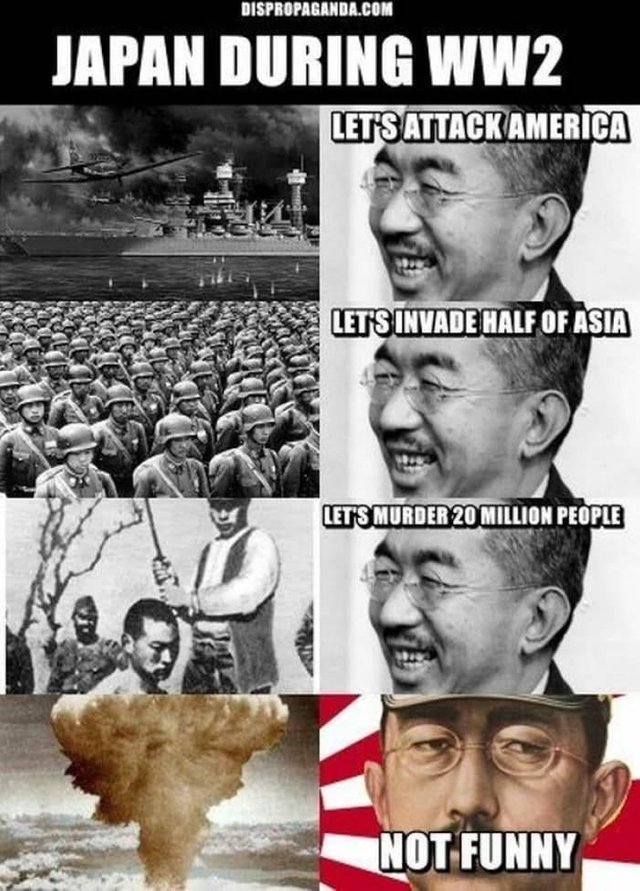It should be noted that not all WW II veterans blindly backed Truman’s decision to nuke Japan, and most of them did not express the barbaric, cruel attitude that some people in this thread have expressed. From 2000 to 2001, a pair of researchers from Ohio State University, Uday Hohan and Leo Maley, interviewed Pacific War veterans on this issue and also searched for previous printed interviews. I quote from their article, “Hiroshima: Military Voices of Dissent,” which is carried on the Ohio State University website:
. . . not all Pacific War veterans applaud the atomic annihilation of two Japanese cities.
Responding to a journalist's question in 1995 about what he would have done had he been in Truman's shoes, Joseph O'Donnell, a retired marine corps sergeant who served in the Pacific, answered that "we should have went after the military in Japan. They were bad. But to drop a bomb on women and children and the elderly, I draw a line there, and I still hold it."
Doug Dowd, a Pacific-theater rescue pilot who was slated to take an early part in the invasion of Japan if it had come to that, recently stated that it was clear in the final months of the war that the Japanese "had lost the ability to defend themselves." American planes "met little, and then virtually no resistance," Dowd recalled. He added, "It is well-known [now] that the Japanese were seeking to make a peace agreement well before Hiroshima."
Or take Ed Everts, a major in the 7th weather squadron of the Army Air Corps. Everts, who received an air medal for surviving a crash at sea during the battle at Iwo Jima, told us that America's use of atomic bombs was "a war crime" for which "our leaders should have been put on trial as were the German and Japanese leaders."
Hohan and Maley go on to note that Admiral Halsey expressed the view that nuking Japan was unnecessary:
Admiral William "Bull" Halsey, the tough and outspoken commander of the U.S. Third Fleet, which participated in the American offensive against the Japanese home islands in the final months of the war, publicly stated in 1946 that "the first atomic bomb was an unnecessary experiment." The Japanese, he noted, had "put out a lot of peace feelers through Russia long before" the bomb was used. (
Hiroshima: Military Voices of Dissent | Origins: Current Events in Historical Perspective)
Naturally, veterans who believed that Japan would not have surrendered without being nuked and that nuking Japan saved the lives of half a million American soldiers—naturally, those veterans supported Truman’s decision. I used to think the same thing and feel the same way.
But, those veterans who knew a bit more about the subject, i.e., who had learned of Japan’s peace feelers and of her prostrate condition, and who had learned that many senior military officers, including Eisenhower, Leahy, and Nimitz, believed we should not have nuked Japan—those veterans did not support Truman’s decision.
Dr. Leó Szilárd, one of the scientists who worked on the a-bomb project, and the man who first proposed building atomic weapons, put the nuking of Japan into moral perspective in a 1960 interview with
U.S. News and World Report:
There was a reason that when Truman first told the American people about the nuking of Hiroshima, he falsely claimed that Hiroshima was a “military base,” not just a military target, but a military base. Actually, of course, it was neither. If Hiroshima was a “military base,” or even a “military target,” then so is every American city with a sea port, an airport, and a contingent of military reservists and/or National Guard soldiers. Hiroshima’s port was mined and useless; Hiroshima had no fortifications; the troops there were in garrison and constituted a small fraction of the city’s population; and most of the city’s factories were on the outskirts of the city and were undamaged in the atomic attack because the bomb was dropped over the center of the city. The factories could have been destroyed with conventional bombing without killing over 100,000 civilians.
